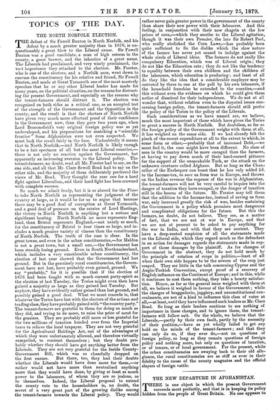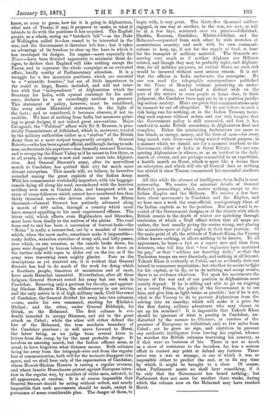THE NEW DEPARTURE IN AFGHANISTAN.
THERE is one object in which the present Government succeeds most perfectly, and that is in keeping its policy hidden from the people of Great Britain. No one appears to know, or even to guess, how far it is going in Afghanistan, what sort of Treaty, if any, it proposes to make, or what it intends to do with the positions it has acquired. The English people, as a whole, seeing no "butcher's bill "—as the Duke of Wellington called it—has ceased to be interested in the war, and the Government is therefore left free ; but it takes no advantage of its freedom to clear up the haze in which it has enveloped its designs. Its organs—more especially the Times—have been directed apparently to minimise those de- signs, to declare that England will take nothing except the Passes, and to represent the whole campaign as an overrated affair, hardly worthy of Parliamentary attention. It is a struggle for a few mountain positions, which are essential to a "scientific frontier," but are of little importance to the world at large, Russia included, and will not inter- fere with that " independence " of Afghanistan which the Secretary for India, with cynical contempt for his audi- ence, declares he is so exceedingly anxious to preserve. This statement of policy, however, must be considered, like every other Ministerial statement, in the light of the facts ; and so considered, it becomes obscure, if not in- credible. We hear of nothing from India but measures point- ing to great designs, if not indeed great annexations. Major Cavagnari, the "Political" officer with Sir S. Browne, is prac- tically Commissioner of Jellalabad, which is, moreover, treated by the military authorities rather as a "station" of the British Army than as a mere outpost temporarily occupied. General Roberts—who has been a great official, and though daring to rash- ness, understands his superiors—has formally annexed Koorum, and is occupying the Khost Valley as if he meant to live there, or at all events, to arrange a new and easier route into Afghani- stan. And General Stewart's army, after its marvellous march to Candahar, has quitted that city for much more distant enterprises. This march will, we believe, be hereafter recorded among the great exploits of the Indian Army. With his commissariat wretchedly imperfect, with his baggage- camels dying all along his road, encumbered with the heaviest artillery ever seen in Central Asia, and hampered with an array of camp-followers which cannot have numbered less than thirty thousand men—the drivers alone must be fifteen thousand—General Stewart has patiently advanced along a march of 400 miles, through a country which must have seemed appalling to his most experienced officers. The bitter cold, which affects even Highlanders and Ghoorkas, must have been deadly to the natives of the plains. The road from end to end has been a succession of torrent-beds—the "Bolan " is really a torrent-bed, cut by a number of torrents which, when the snow melts, sometimes make it impassable— rocky defiles, waterless stretches of stony soil, and lofty passes, over which, on one occasion, as the camels broke down, his guns were dragged by human labour, only to be let down on the farther side with ropes in slides cut on the ice, as if the army were traversing some mighty glacier. Poor as the descriptions as yet received are, it is evident that General Stewart has had to do much of the work for doing which a Southern people, timorous of mountains and of snow, have made Hannibal immortal. Nevertheless, after all these fatigues, General Stewart rested his army but one week in Candahar. Reserving only a garrison for the city, and appoint- ing Gholam Hussein Khan, the soldier-envoy in our service, and the only native in it of high military rank, Civil Governor of Candahar, the General divided his army into two columns, —one, under his own command, starting for Khelat-i- Ghilzai ; and the other, under General Biddulph, for Girisk, on the Helmund. The first column is evi- dently intended to occupy Ghuznee, and aid in the great attack on Cabal; while the other will either defend the line of the Helmund, the true northern boundary of the Candahar province ; or will move forward to Herat, the latter being, as we judge from several hints in letters from the camp, by far the most probable design. It involves an amazing march, but the Indian officers seem, as usual, to have forgotten what distance means. Both columns being far away from the telegraph-wire and from the regular line of communication, both will for the moment disappear into space, and we shall hear only of the organisation of Candahar, where Nuwab Gholam Hussein is raising a regular revenue, and where fanatic Mussulmans protest against European intru- sion in the regular way, by murders of white men, selected, to all appearance, at random. It is of course impossible that General Stewart should be acting without orders, and nearly impossible that such movements should be made, except in pursuance of some considerable plan. The danger of them, to begin with, is very great. The thirty-five thousand soldiers engaged, in one way or another, in the war, are now, or will be in a few days, scattered over six points—Jellalabad, Dhakka Koorum, Candahar, Khelat-i-Ghilzai, and the Helmund—separated ' d-separated from each other by wide stretches of mountainous country, and each with its own communi- cations to keep up, if not for the supply of food, at least for the transport of military materiel. The Generals are moving very much as if neither Afghans nor Hillmen existed, and though they may be perfectly right, and Afghani- stan, for all military purposes, an extinct State, no such risk would be incurred without most serious reason. It is not that the officers in India under-rate the enterprise. No one can read the telegraphic correspondence published in the Times of Monday without perceiving an under- current of alarm, and indeed a distinct wish on the part of the writers to warn people at home that, in their judgment, the Candahar force may yet be in a position justify- ing serious anxiety. Hints are given that communications may in summer be cut off altogether. We do not believe in such a risk being run for nothing, or in the Indian Treasury incur- ring such expense without orders, and can only imagine that the Government policy is still concealed, and that it has resolved to make British ascendency in Afghanistan final and complete. Either the minimising declarations are more or less blinds, or energy, money, and the lives of men—for every long march costs lives—are being wasted without purpose, in a manner which we should not for a moment attribute to the Government either of India or Great Britain. We are con- quering Afghanistan in silence, or as an incident in the daily march of events, and are perhaps committed to an expedition, a hostile march on Herat, which is more like a dream than an enterprise, and which will stir all Central Asia as nothing has stirred it since Timour commenced his successful southern march.
All this while the absence of intelligence from India is most noteworthy. We receive the minutest details of General Roberts's proceedings, which matter nothing, except to the Indian Empire and the Hillmen. We receive a few bare facts about movements in Candahar and the Khyber, and we hear once a week the semi-official, semi-gossippy ideas of the Indian capitals as to the position. But not a word is re- vealed of the Government designs, or of the objects with which British armies in the depth of winter are marching through territories of which a Staff officer writes that all maps are useless, the best usually giving the routes wrong, and placing the mountain-spurs at right angles to their true position. Of the main point of all, the attitude of Yakoob Khan, the Viceroy either knows nothing, or allows nothing to be known. To all appearance, he hears a fact or a report now and then from deserters, who tell him that "four regiments have mutinied for pay," or that "soldiers are deserting daily," or that the Turkestan troops are very disorderly, and nothing at all beyond. Yakoob Khan is evidently at Cabul, and as evidently does not intend to commence negotiation; but whether he means to fight for his capital, or to fly, or to do nothing and accept events, there is no evidence whatever. Yet upon his movements the future of the war and of our position in Afghanistan must mainly depend. If he is willing and able to go on reigning as a vassal Prince, the policy of the Government is to use him, and give him as light terms as possible ; but if he is not, what is the Viceroy to do to prevent Afghanistan from dis- solving into an anarchy, which will make it a prize for the first daring military adventurer who may choose to set up his standard ? It is impossible that Yakoob Khan should be ignorant of what is passing in Candahar, un- disturbed by the menace to Ghuznee, or careless of the presence of Europeans in Jellalabad, only so few miles from Cabul ; yet he gives no sign, and contrives to prevent any authentic intelligence from leaving his capital, whence he watches the British columns traversing his country, as if that were no business of his; There is not so much as a show of resistance to the invaders, far less a serious effort to contest any point or defend any fortress. There never was a war so strange, or one of which it was so impossible either to predict the end, or to fix any time by which it might be brought to a close. Of course, when Parliament meets we shall hear something, if it be only that the Government has heard nothing ; but Parliament does not meet for another three weeks, during which the column now on the Helmund may have reached Herat.



































 Previous page
Previous page